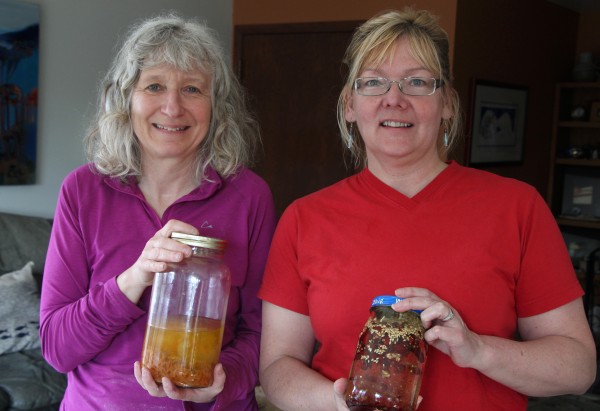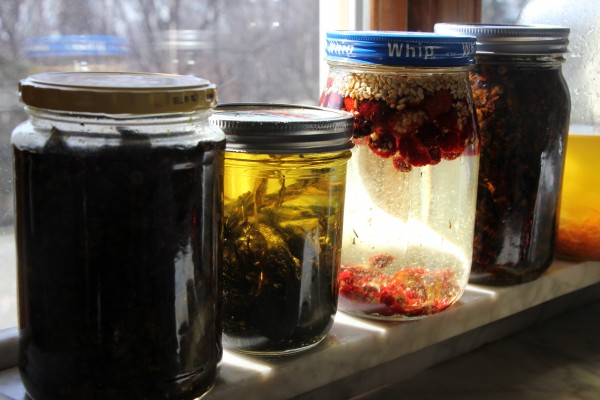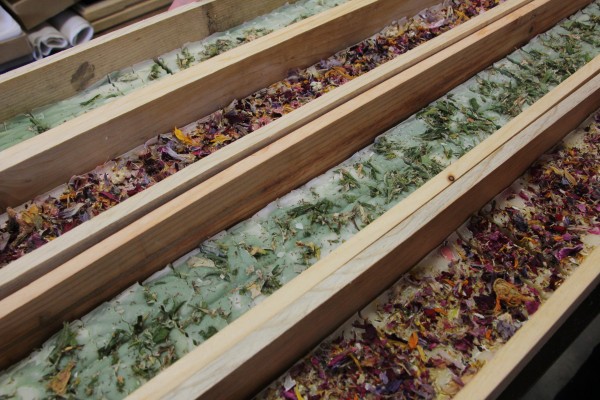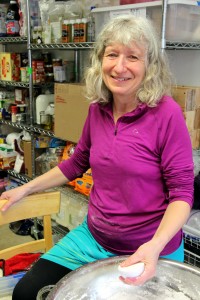
Right now the tundra and forests of Bristol Bay are exploding with flora. While many foragers have already supped on fiddlehead ferns and are looking forward to wild berry picking, some may overlook the traditional medicinal uses of many Alaskan plants. Two Dillingham women set out to capture the benefits of these native plants in a line of homemade bath products – they call it “Tundra Love.”
It’s a bright spring afternoon, and the ground floor of Lynn Van Vactor’s home smells of shea butter and citrus. With hot plates, a weigh scale, and bottles of oils on the shelves, the space feels like part chemistry lab, part art studio.
Van Vactor and her business partner Denise Lisac hand me a mason jar filled with a dark oily mixture.
“That’s chaga,” she said, as oil sloshed around in the jar. “We’re infusing chaga. We haven’t used this yet and it’s just infusing. Look at that beautiful black color of the oil.”

Other jars are lined up against the sunny window, filled with infusions of rosehips, carrot, and cottonwood buds. Van Vactor explains, this is an early step in the long process of making a soap or salve.
“Let it sit for six weeks in the sun, and every day you turn and toss those oils,” she said. “Yeah, so that’s some chythlook.”
This basement operation got its start just last fall, when Van Vactor and Lisac both signed up for a class taught by the Alaska Native Tribal Health Consortium on native plants.
“‘The Store Outside your Door,’ basically,” she said. “So Denise and I sat next to each other. That’s how it started – yeah, that’s how it started.”
The training taught about local plants that elders in Bristol Bay have used medicinally for generations. These healing plants are all over the place: Plantain is a natural antibacterial; Rose hips are high in Vitamin A for healthy skin.
“And the birch bark has salicylic properties that can treat some of those conditions of inflammation and soreness,” she said.
Van Vactor and Lisac shared a fascination with these plants.
And when they decided to do something about it, they found they each brought a useful skill set to the table.
“I started out in nursing, psych and pre-med,” Van Vactor said. “So I’ve always had an affinity for naturopathic medicine, and Denise has this expert gardening knowledge of plants.”

So they had a pretty good foundation. But, she says, they still have a lot to learn on the healing side of things.
“The native healers that use these products will spend a year just studying one plant to really understand the therapeutic benefits of those plants… so we’re no way in that category,” she said. “But we’ve had enough knowledge and ability to utilize the plants for things that we’d actually want in our day-to-day life.”
So, with a lot of research and some digging in the dirt, they started making soaps, salves, and bath bombs. Each recipe includes local plants for a specific purpose. And the products have upbeat names like “Pick Me Up!” “Restore My Skin” and “Aches Away.”

Both Lisac and Van Vactor are semi-retired from long careers, so they’re not expecting to make a living off Tundra Love. But with a price point of $10 for 2 ounces of salve or balm, they say they were able to earn back their initial investment. Their first big sale at Christmas time sold out.
Since then, they’ve gotten rave reviews. Friends and family are asking them to make more.
“I know of a person whose feet had been in pain for months and months,” she said. “And those salves have helped alleviate the pressure in their feet and they’re able to walk better… so there’s these little testimonials coming up.”
Encouraged by those happy customers, Van Vactor and Lisac are dreaming up new products. They’re watching for summer plants to come up so they can infuse another batch of oils. One of the biggest lessons learned, Van Vactor says, is that the recipes go based on what Mother Nature provides.
For example: they’re itching to try out a naturally bug repellent oil made from wild yarrow. But, “It’s gonna be at least a couple months for the yarrow… And it REALLY goes gangbusters in the fall. You’ll get little sprouts coming up between now and then – Yeah you’ll pull it out of your garden – Yeah but now, when we pull it out of our garden, we’ll set it aside – we’re going to use it!”
While their first priority is to make enough for local customers, Lisac and Van Vactor eventually want to expand. They imagine a network of Tundra Love producers, bringing healing plants into homes all over Bristol Bay.
Hannah Colton is a reporter at a in Dillingham.




